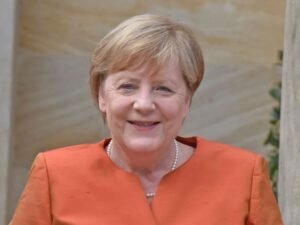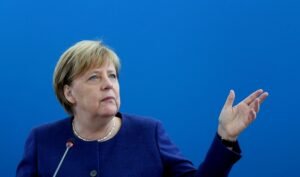Angela Merkel biography, early life age and career
Angela Dorothea Merkel, born on July 17, 1954, in Hamburg, Germany, is widely regarded as one of the most influential political leaders of the 21st century. Merkel served as Germany’s Chancellor from 2005 to 2021, becoming the first woman to hold the office. Her tenure was marked by steady leadership during global crises, a commitment to European unity, and groundbreaking climate initiatives. Known for her pragmatic and science-based approach to governance, Merkel’s legacy extends far beyond Germany’s borders, earning her the nickname “Mutti” (Mother) for her nurturing yet firm leadership style.
Angela Dorothea Merkel Early Life
Angela Merkel was born to Horst Kasner, a Lutheran pastor, and Herlind Kasner, a teacher of English and Latin. Shortly after her birth, her family moved to East Germany, where her father took up a pastoral position. Growing up in the small town of Templin, Merkel excelled academically, showcasing an early aptitude for mathematics and science.
Despite the restrictions of life in communist East Germany, Merkel’s parents instilled in her a sense of curiosity and resilience. These qualities would later define her political career. Her childhood experiences of living under an authoritarian regime gave Merkel a unique perspective on freedom and democracy, shaping her political ideology.
In 1973, Merkel began studying physics at the University of Leipzig. She later earned a doctorate in quantum chemistry in 1978, a rare accomplishment for women in the field at the time. Her scientific background profoundly influenced her analytical and evidence-based decision-making as a politician.
Angela Dorothea Merkel Career and Accomplishments
Angela Merkel’s political journey began after the fall of the Berlin Wall in 1989. She joined the newly formed Democratic Awakening party and quickly rose through the ranks of German politics. In 1991, she became the Minister for Women and Youth under Chancellor Helmut Kohl. Recognizing her potential, Kohl nicknamed her “das Mädchen” (the girl), mentoring her in the early years of her political career.
Merkel’s rise continued as she took on the role of Minister for the Environment, Nature Conservation, and Nuclear Safety in 1994. Her tenure was marked by significant contributions to environmental policies, including hosting the 1995 Berlin Climate Change Conference, which laid the groundwork for international climate agreements.
In 2000, Merkel became the leader of the Christian Democratic Union (CDU), a pivotal moment that positioned her as a central figure in German politics. Five years later, she made history by becoming Germany’s first female Chancellor.
Angela Dorothea Merkel Key Achievements
- Crisis Management: Merkel’s tenure as Chancellor was defined by her leadership during crises, including the 2008 financial meltdown, the Eurozone debt crisis, and the European refugee crisis of 2015. Her decision to welcome over a million refugees showcased her humanitarian values, though it sparked controversy.
- Climate Advocacy: Merkel, often called the “Climate Chancellor,” played a significant role in advancing renewable energy and reducing carbon emissions. Her leadership helped Germany become a global leader in clean energy initiatives.
- European Unity: Merkel was a steadfast advocate for European integration, strengthening the European Union’s cohesion during turbulent times, including Brexit and the COVID-19 pandemic.
- Global Influence: As one of the world’s most powerful women, Merkel consistently ranked at the top of Forbes’ list of the most influential women. She was a key player on the global stage, fostering strong relationships with world leaders.
Angela Dorothea Merkel Personal Life
Angela Merkel’s personal life is characterized by simplicity and dedication. She married physicist Ulrich Merkel in 1977, though the marriage ended in divorce five years later. In 1998, she married Joachim Sauer, a quantum chemist and professor, with whom she shares a love for the sciences. Despite her public role, Merkel has always kept her personal life private, rarely discussing it in the media.
Merkel is known for her pragmatic lifestyle, often seen grocery shopping herself and living in a modest apartment in Berlin. Her values of humility and discipline resonate with the German public, enhancing her image as a relatable and grounded leader.
Angela Dorothea Merkel Legacy
Angela Merkel’s impact on Germany and the world is profound. As the first woman to serve as Chancellor, she shattered gender barriers in politics, inspiring women globally. Her leadership during crises earned her a reputation as a stabilizing force in international politics.
Merkel’s legacy includes her commitment to multilateralism, her efforts to combat climate change, and her advocacy for human rights. Though her refugee policies faced criticism, they underscored her compassion and commitment to global solidarity.
Beyond politics, Merkel’s influence lies in her leadership style—calm, methodical, and focused on consensus-building. Her approach has become a model for effective governance in an increasingly polarized world.
Conclusion
Angela Merkel’s life and career epitomize resilience, intelligence, and dedication. From her humble beginnings in East Germany to becoming one of the world’s most respected leaders, Merkel’s journey is a testament to the power of perseverance and principled leadership. As she steps away from the political stage, her contributions to Germany and the global community continue to inspire future generations.
FAQs About Angela Merkel
What is Angela Merkel known for?
Merkel is best known for her 16-year tenure as Chancellor of Germany, where she led the country through multiple global crises, promoted renewable energy, and strengthened European unity.
What was Angela Merkel’s early career before politics?
Merkel was a trained physicist with a doctorate in quantum chemistry. Before entering politics, she worked as a researcher and scientist.
Why is Merkel called “Mutti”?
“Mutti” (Mother) is a nickname attributed to Merkel’s nurturing yet firm leadership style. It reflects the trust and affection many Germans have for her.
What are Merkel’s views on climate change?
Merkel has been a vocal advocate for climate action, earning the nickname “Climate Chancellor.” She spearheaded initiatives to transition Germany to renewable energy sources.
What is Angela Merkel doing now?
Since stepping down in 2021, Merkel has largely stayed out of the public eye, focusing on personal pursuits such as reading and spending time with famil


